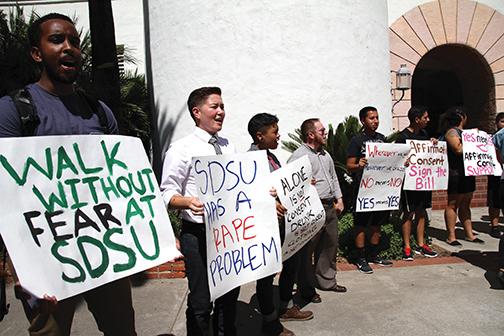In a demonstration led by San Diego State students, posters with the phrase “Consent is hot, rape is not” were waved around Hepner Hall to support the recent affirmative actions Senate Bill 976. With sexual assault being such an unfortunate and frequent occurrence in the college area, it’s important for students to be well informed about the bill, which has resulted in the “Yes Means Yes” law.
The fact that there were three sexual assault reports made to the SDSU Police Department in September alone is unfathomable. This bill will work to help educate more students about their rights while helping prevent rape. Although the purposes of this bill are well developed, it won’t pose useful unless this campus enforces its policies.
“I think it’s important for all students to be conscientious and aware citizens,” demonstrator and computer science junior Osama Alkhawaja said. “Ignorance to what is occurring is not an excuse when it comes to injustices. If we don’t stand up and defend the rights of the sexually assaulted victims, then we are just as guilty as the rapist.”
“Yes Means Yes” is currently a hot topic and the newly passed law by Gov. Jerry Brown. This law makes California the first state to confirm sexual consent by an affirmative “yes.” Surprisingly, however, a lot of students don’t even know what this new law indicates, even with the horrific amount of sexual assaults that have occurred at SDSU in the recent months.
The recently passed law specifies both individuals involved in any sexual activity must consciously make affirmative consent in order to willingly engage in said activity. This affirmative consent law aims to prevent any vagueness that could be associated with a nod or smile. In addition, it requires colleges to implement new policies in support of affirmative consent.
“Affirmative consent means if I’m interested in having a sexual contact with another person, I must first find out if that other person wants to do it with me,” Carl Mosley, director of educational and training program, “We End Violence,” said.
The students who were a part of the demonstrations spoke up and expressed how sexual assaults are subjective to campus culture, considering that a majority of sexual assaults occur whilst people are under the influence. These demonstrators voiced their opinion and concerns about campus safety; their apprehensions with campus safety projects sincere care for students who wish to walk around campus, whether after a night class or a party, without the fear of being sexually assaulted.
Now that the bill has been passed, it’s imperative for more students at SDSU to become better educated with their rights when it comes to sexual assault because it is preventable. With that said, it’s also imperative for SDSU to take the appropriate measures.
“This bill is not the solution, it is just a step,” Alkhawaja said. “The burden now falls on our university and on our fellow students to implement tangible programs and initiatives to help educate the population and hopefully stop these assaults from occurring.”
So many people believe nothing bad will ever happen to them. The gruesome idea of being sexually assaulted is a distant concern until it actually occurs. No one is immune to being a victim or suspect of sexual assault and that’s why education of this law is necessary.
The more students are informed about affirmative consent, the less likely sexual assaults will occur. A lot of young men and women are sexually assaulted because they are either under the influence or their lack of consent isn’t acknowledged. Well, now it’s no longer necessary to even have to say “no,” because all sexual activity requires affirmative consent.
It’s hard for a person to know how to react in a situation they have never been in. It seems as though communicating the unwillingness to engage in sexual activity would be clear-cut, but that’s often not the case. Sexual assault doesn’t always occur with strangers; in fact, it often occurs with someone familiar. In these situations, saying “no” might not be the easiest to communicate and it might not even be well received.
“There are instances where a girl or guy is way too under the influence to say no, so waiting for a yes is the easiest way to ensure their wants and basic safety needs are met,” public relations sophomore Alexis Evans Bendel said.
This bill clearly highlights what consent looks and sounds like. There is no logical reason why anyone should be against the education of this law considering it is only in the best interest of anyone involved.
It’s extremely admirable that there are students at SDSU who are concerned about the safety of our campus and voice their opinions through demonstration. Now that the bill is signed, a lot of positive change on campus will be necessary, especially when it comes to sexual safety.











